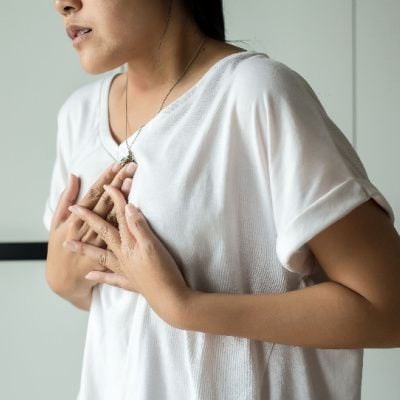 What is GERD?
What is GERD?
GERD is a digestive disorder that can cause heartburn, regurgitation, or acid indigestion. This disorder is caused by relaxation of the muscle at the end of the esophagus (food pipe) - the lower esophageal sphincter (LES), which allows the stomach’s contents to come back up into the esophagus.
Common signs and symptoms of GERD include heartburn and regurgitation. Heartburn may feel like a warm or burning feeling in the chest that may be worse after eating or when lying down.
Other symptoms of GERD may include chest pain, difficulty swallowing, sore throat, nausea, vomiting, unexplained cough, voice changes, wheezing, or throat clearing.
Foods to avoid
Certain foods cause the lower esophageal sphincter to relax, which can result in acid reflux.. These foods can disrupt the digestive process. Things like fried foods or highly acidic foods should be avoided, especially before bedtime. Other foods to limit include:
- Fast food
- Spicy foods
- Fatty foods and meats
- Tomato-based sauces
- Citrus fruits
- Chocolate
- Cheese
- Peppermint
- Carbonated beverages
- Caffeinated beverages
- Alcohol
- Coffee
- Tea
- Garlic and onions
Foods helpful for acid reflux
Just as there are harmful foods for acid reflux, there are foods that can help prevent GERD flare-ups. Foods that are known to assist with GERD often have high fiber, which allows you to feel fuller and overeat less often. Alkaline and foods high in water content are also great options. Examples include:
- Watermelon
- Lettuce
- Herbal tea
- Bananas
- Nuts
- Whole grains
- Sweet potatoes
- Broccoli
- Cucumber
- Celery
- Melons
- Cauliflower
- Fennel
- Brown rice
- Couscous
- Carrots
- Beets
- Asparagus
- Green beans
Other changes to your diet and lifestyle can help:
- Weight loss
- Stop smoking
- Eating smaller frequent meals instead of several large meals
- Avoid eating at least 3 hours before bedtime
- Elevate the head of your bed 6-8 inches
- Wear comfortable clothing that is not tight around the waist
If you are experiencing long-term symptoms of GERD, contact your doctor to assess if you should get testing or prescribed medications. Your primary care physician may recommend you see a gastroenterologist who is a specialist in digestive disorders.
Disclaimer:
The information on this website is provided for educational and information purposes only and is not medical advice. Always consult with a licensed medical provider and follow their recommendations regardless of what you read on this website. If you think you are having a medical emergency, dial 911 or go to the nearest emergency room. Links to other third-party websites are provided for your convenience only. If you decide to access any of the third-party websites, you do so entirely at your own risk and subject to the terms of use for those websites. Neither Gliroy Endoscopy Center, nor any contributor to this website, makes any representation, express or implied, regarding the information provided on this website or any information you may access on a third-party website using a link. Use of this website does not establish a doctor-patient relationship. If you would like to request an appointment with a health care provider, please call our office at (408) 848-8336.
 What is GERD?
What is GERD?
